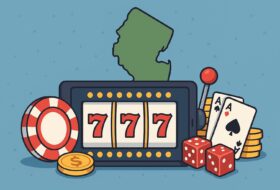
10 years ago this week, the online poker world was rocked by the events that came to be known as Black Friday.
On Apr. 15, 2011, the US Department of Justice filed a civil complaint against PokerStars, Full Tilt and the Cereus Network (Absolute Poker/Ultimate Bet) and unsealed a 52 page criminal indictment against their senior staff. It alleged that they had breached the Unlawful Internet Gambling Enforcement Act (UIGEA) and accused them of money laundering and bank fraud.
The DOJ seized all three operators’ domain names, taking them abruptly offline. They remained down for nine days until Apr. 20. PokerStars and Full Tilt managed to come back online (albeit with US customers now excluded) following a deal with the DOJ. Cereus remained offline, and filed for bankruptcy soon thereafter.
The details occupied the online poker press for years afterwards. Now, at the decade anniversary, Online Poker Report takes a look at what has happened in those years since Black Friday.
Online poker in the US has still not recovered from those dramatic events. It is on the road to recovery, yet the poker industry and community today are much different than they were then. Here are the ten biggest stories of those ten years, from the industry’s perspective.
#1: Online lotteries pose Wire Act questions
The groundwork for state regulated online poker was laid when lawmakers sought clarity on the subject of New York and Illinois sought an opinion on whether they could sell state lottery products online.
The Wire Act of 1964 was written at a time when neither the internet, nor state lotteries existed. (New Hampshire became the first state with a lottery that same year).
It was therefore unclear on this issue. If it applied to all gambling, then it meant that federal law prohibited online lotteries. If it applied only to sports betting, then states had the right to legalize online gambling within their borders.
On September 20, 2011, just five months after Black Friday the DOJ issued the following opinion:
“Interstate transmissions of wire communications that do not relate to a “sporting event or contest” fall outside the reach of the Wire Act.
Because the proposed New York and Illinois lottery proposals do not involve wagering on sporting events or contests, the Wire Act does not prohibit them.”
In that moment, everything changed. Suddenly, states had the power to legalize most forms of online gambling. Online poker now waited only for legislative approval.
#2: PokerStars buys Full Tilt
The next shock to hit came the following July, when it PokerStars announced that it had reached another deal with the DOJ. Full Tilt, which had not segregated player funds, could not reimburse all of its players and was bankrupt. For $547 million, PokerStars agreed to acquire the company and make its players whole.
As part of the same deal, PokerStars founder Isai Scheinberg agreed to exit his executive role in the company. However, he remained abroad and did not travel to the US to face justice until many years later.
PokerStars undertook to repay all Full Tilt balances owed to poker players. It did this within three months for non-US players, but US players had to wait considerably longer. US reimbursements were a drawn-out process, with the DOJ appointing an administrator to execute the distribution.
However, players at Absolute Poker and Ultimate Bet lost all their money. This triggered gaming regulators worldwide to re-examine their rules for the management of player funds. Today all US regulators insist that licensed operators fully segregate client funds from operating capital.
#3: Legal online poker returns to the US
It took another year to see the first legal hand of state regulated online poker. A new company, Ultimate Poker, beat the big operators to the market in Nevada on Apr. 30, 2013. Delaware and New Jersey quickly followed.
At the time it seemed that online poker was on its way back in the US in a big way. Unfortunately, it took another six years before any other states got on board with the trend.
Being first to market wasn’t enough of an advantage, and Ultimate Poker ultimately folded. In doing so, however, it demonstrated the importance of regulated markets and segregated accounts, as it returned all player funds promptly and in full.
Online poker’s popularity went into the doldrums. Initial estimates in New Jersey were that online casino and online poker would generate similar revenue. Instead, online casino soared, while poker flatlined, and now online poker accounts for less than 10% of total gaming revenue in the state.
#4: Lottery SNGs change the market
Over in Europe and the rest of the world, online poker was staging a comeback. Online poker revenue at PokerStars bounced back and major tournament series re-established prize pools similar to those from before Black Friday.
Part of this success was due to a major innovation—the lottery sit & go (LSNG).
PokerStars claims the innovation as its own, based on its Golden SNG promotions. However, the standard LSNG format as it exists today came from French operator Winamax, which launched its version, Expresso, as a permanent product in July 2013.
Other operators quickly picked up this innovation, including PokerStars, with Spin & Go. Lottery SNGs made a big difference to bottom line financials. PokerStars soon saw tournament revenue overtake cash games for the first time as the new games soared in popularity.
No innovation since has produced such a big jump in income. It has, however, made operators much more open to experimenting with new games and formats as they try to replicate that success.
It has also changed the nature of poker from what it was before Black Friday. Games are faster now, involve more luck and create much more engagement for recreational players, yet smaller edges for pros.
#5: Multi-State Internet Gaming Agreement expands WSOP player pool
Perhaps less surprising than other stories in this piece, but important for the future of poker was the Feb. 2014 Multi-State Internet Gaming Agreement (MSIGA). Signed by Nevada and Delaware, the agreement enabled WSOP – and theoretically other operators – to network those two states together.
Nevada and especially Delaware have small populations that make for very small tournament guarantees and little cash game traffic outside of peak hours. The MSIGA allowed them to alleviate the problem by pooling their players.
New Jersey joined the MSIGA in Oct. 2017, adding players from its own state population of almost nine million. Michigan is now seeking to do likewise, and Pennsylvania may follow. With those two states, the interstate player pool would almost triple in size.
#6: Supreme Court overturns PASPA
2018 saw the US Supreme Court overturn the Professional and Amateur Sports Protection Act. This opened the door to state-regulated sports betting. Since then more and more states have legalized sports betting, motivated by the substantial tax revenue it generates.
Though this had nothing to do with poker directly, several states have ended up legalizing online poker alongside sports betting.
Moreover, states that legalize sports betting on its own may be more amenable to adding poker in years to come. Sports betting has been a catalyst for gambling expansion in general, so without the end of PASPA, the future of online poker in the US would be looking bleak.
#7: The Wire Act rises from the dead
It hasn’t all been forward progress. Nov. 2018 saw the largest potential blow to US online poker since Black Friday. The DOJ issued a new interpretation of the Wire Act claiming that it now applied to all gambling.
This new stance from the DOJ was a complete reversal of its previous opinion and risked ending interstate poker altogether as well as making additional gambling expansion more difficult. Fortunately, the New Hampshire Lottery challenged the DOJ, fearing that it would impact interstate lotteries like Powerball.
In Jan. 2021, the First Circuit Court of Appeals upheld a lower court verdict that the DOJ was wrong. There remains a small possibility that the DOJ will appeal to the Supreme Court, but this seems unlikely.
President Biden does not appear to support such an appeal and the Supreme Court may decide not to hear it in any case. If the verdict stands, the status quo will be restored and US interstate poker will remain legal. 10 years after Black Friday, state-regulated online poker is within touching distance of the firm legal foundation it needs.
#8: Pennsylvania launches online poker
Nearly six years after the first three states launched legal online poker Pennsylvania joined them. PokerStars PA launched in Nov. 2019, renewing hopes for the expansion of US online poker. With a population of nearly 13 million, it more than doubled the total size of legal markets for online poker in the US at that time.
This came not so much as a shock, but as a relief that the spread of online poker had not come to a dead stop.
Since then, Michigan has also joined the club, dealing its first hands in January this year. West Virginia also legalized online poker in spring 2019, though no operator has yet launched there.
#9: The black market thrived during the downtime
The years after Black Friday created a booming black market for online poker. Without legal alternatives, many US poker players, particularly professionals, turned to these sites.
By 2015, offshore site Americas Cardroom shocked the industry by offering its first $1 million guaranteed tournament. Before Black Friday such enormous guarantees were only available at the biggest sites.
This period was also full of reminders of why looking to offshore sites as a substitute for legal poker is a bad idea. Topping the list of distasters was Lock Poker, which collapsed in Apr. 2015 taking all its players’ balances with it.
These negative consequences of Black Friday lasted a very long time.
#10: The legal market has been scandal-free
In a way, the biggest story of the last 10 years is the one that didn’t happen. Not a single major scandal has hit the regulated US online poker industry:
- There have been no disastrous headlines about rigged games,
- No players have lost their money due to an operator’s bankruptcy,
- Regulators have reported no significant under-age gambling, and
- Problem gambling has not exploded.
Ten years after Black Friday, the only winners to come out of the federal government’s prohibitionary stance have been illegal offshore operators. Meanwhile, the worst events to have plagued the legal industry have been a few small fines for minor violations, and one obscure software bug affecting a tiny percentage of WSOP players. If anything, it has been less problematic than the long-standing live poker industry in the US.
The past ten years have been a turbulent ride. However, US online poker now finds itself on more stable footing, and will perhaps see faster progress over the next decade.




